Mid-Sized Thickness Planers
Fine Woodworking editors try 14 machines from Taiwan, Japan and Canada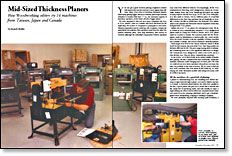
Synopsis: Editors at Fine Woodworking evaluate 14 examples of 14- to 16-in. thickness planers for a number of features. They look at surface quality of lumber after planing, ease of assembly, instruction manuals, warranties, knife changing, and price. The results are compared in a chart; all the planers did a good job of planing, though some were easier to assemble than others. The editors tell which details made the difference among the various machines; they also share which stood out. A side article discusses differences among models made by the same factory and offers illustrations of varying types of cutterheads.
You can get a great workout planing roughsawn lumber with hand tools, but the exercise is more quaint than efficient. Many of us resort to benchtop thickness planers, which keep getting bigger. But if you routinely plane large amounts of lumber or boards wider than in., the maximum capacity of benchtop machines, you’re better off with a bigger planer.
We were surprised to discover how many companies sell 14-in. to 16-in. planers, what we consider mid-sized machines for the small shop. We invited 15 companies to participate in our review. Thirteen responded, and we ended up with 14 planers. Despite the many labels, the majority of the machines came from the same Taiwanese assembly plant, Chiu Ting Machinery, also known as Geetech (although the individual components of these machines may come from different sources). Not surprisingly, all the 15-in. machines from Chiu Ting—AMT, Bridgewood, Grizzly, Jet, Powermatic, Reliant, Sears, Star Tools, Sunhill and Woodtek—are similar in many respects (see the box on pp. 54-55). The 15-in. Delta planer is also made in Taiwan, but at a different plant. It’s somewhat different from the Chiu Ting machines but not drastically so. Actually, it looks a lot like its predecessor, the Rockwell 13-in. planer, which is the machine the Taiwanese used as inspiration when they designed their 15-in. planers.
Makita sent us its -in. planer, the only Japanese entry. We also looked at a few industrial-duty machines, a 16-in. Bridgewood planer made by Chang Iron Works in Taiwan, and a 14-in. planer made by General in Canada. The American-made RBI 816 Woodplaner, made by RBIndustries in Harrisonville, Mo., wasn’t included in our review because it has the capability of being converted into a molder or sander. This review is limited to dedicated planers.
Prices range from $765 for the Grizzly (without a stand) to about $3,200 for the General. But most of the 15-in. Chiu Ting models cost between $800 and $1,300. The price range among these is substantial considering there are so few significant differences in design. The General and 16-in. Bridgewood, which costs $2,795, are in a class all their own. They are heavy, industrial-duty machines.
In our review, we looked closely at the surface quality of lumber after planing. We also considered the ease of assembly, instruction manuals, warranties, knife changing and, of course, price. We wish we could tell you how these machines will perform over time, but that’s not possible in this kind of review. We do want to find out how well a machine that costs about $1,000 holds up, so we’re buying one of the Taiwanese models. After using it for a year, we’ll do a follow-up report.
From Fine Woodworking #127
For the full article, download the PDF below:
Fine Woodworking Recommended Products
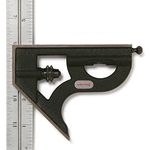
Starrett 12-in. combination square
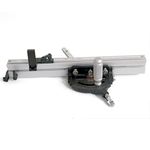
JessEm Mite-R Excel II Miter Gauge
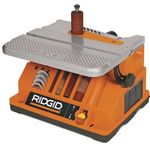
Ridgid EB4424 Oscillating Spindle/Belt Sander





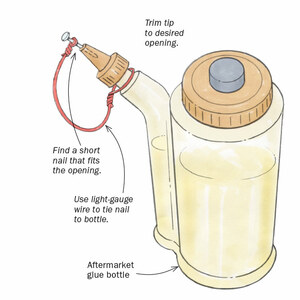
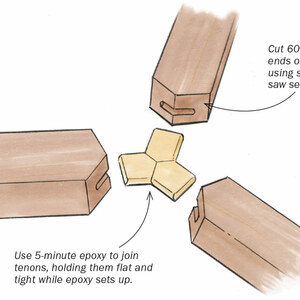



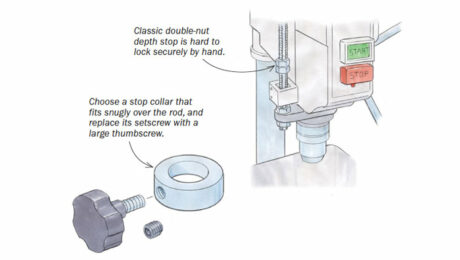
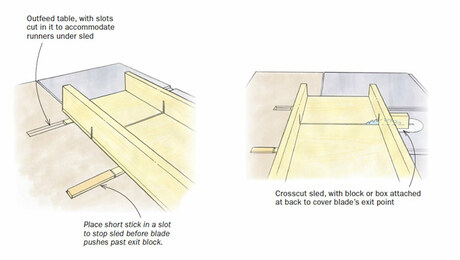
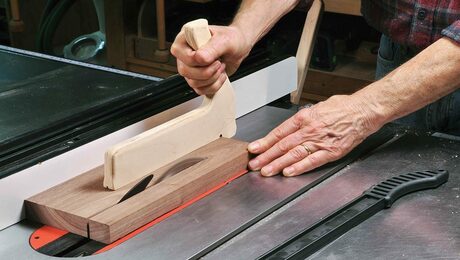
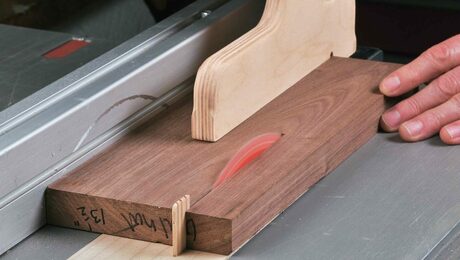








Log in or create an account to post a comment.
Sign up Log in